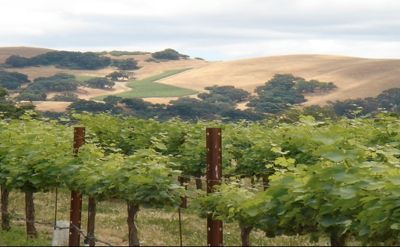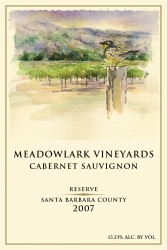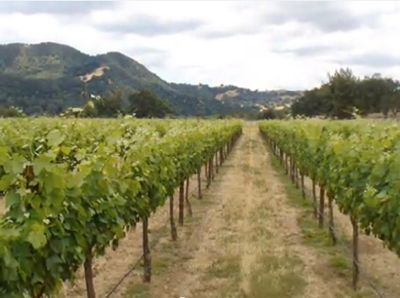
Plano residents Ramon and Sandra Guerrero ensure their vineyard in Santa Barbara County, Calif., uses sustainable farming practices. Photos courtesy of Meadowlark Vineyards.
Oct. 22, 2014
By Rita Cook
A Plano anesthesiologist by day, Ramon Guerrero moonlights as a vineyard owner in Southern California on the weekends and nights. And in his quest to create the perfect wine, he has another ambition – to make sure his farming practices are eco-friendly.
While Guerrero’s Meadowlark Vineyards no longer adheres to the California Certified Organic Farmers and USDA certified organic rules on paper, he says they still do everything responsibly and are equally as sustainable as they ever were, minus the exorbitant fees associated with maintaining the paperwork.
 “We were certified by the CCOF and the USDA through our 2014 growing season,” he explains. “But due to rising costs and increasing regulations, we have elected not to continue with the official certification process. California regulatory hurdles, fees, etc. have prompted these changes for us. It is at times like these that I do miss the business friendliness of Texas.”
“We were certified by the CCOF and the USDA through our 2014 growing season,” he explains. “But due to rising costs and increasing regulations, we have elected not to continue with the official certification process. California regulatory hurdles, fees, etc. have prompted these changes for us. It is at times like these that I do miss the business friendliness of Texas.”
So how do wine drinkers know they’re drinking organic wine when they sip the Meadowlark brand?
“All our applications are placed by the organic branch of CPS (Crop Production Services). They are a third party, which also has to be certified. They in turn will keep all those records and supply them to the Santa Barbara County Agricultural Department. These are public records that the consumer can request from any local agricultural department,” Guerrero says. “What you get now is money that goes into making the sustainable wine.”
 The vineyards first non-certified organic harvest was this year but Guerrero says they will continue to pursue sustainable farming in the region where he was raised.
The vineyards first non-certified organic harvest was this year but Guerrero says they will continue to pursue sustainable farming in the region where he was raised.
Born in Guadalajara, Mexico, Guerrero immigrated with his parents to California when he was in the fifth grade. After graduating from a Santa Barbara high school, he attended college at Carleton College in Minnesota and then returned for medical school at the University of California at Davis.
He opened his ranch in Santa Ynez, California near Santa Barbara in 2001 and planted his first vines in 2002. When asked why he doesn't grow the vines in Texas where he lives now, he says Mother Nature made that decision for him.
 “Being a farmer is extremely difficult. It is an expensive business with low margins and it requires tremendous amount of physical work. When you add the stress of Mother Nature’s unpredictability, especially in Texas, your farming endeavors can be overwhelming. I have the greatest admiration for grape growers in Texas. We chose to grow in California because the predictability of Mother Nature during the critical times of fruit maturation. Late frosts that will freeze our vines around bud break are extremely unusual. During fruit maturation there are no thunderstorms or showers that will damage the fruit or add to mildew problems.”
“Being a farmer is extremely difficult. It is an expensive business with low margins and it requires tremendous amount of physical work. When you add the stress of Mother Nature’s unpredictability, especially in Texas, your farming endeavors can be overwhelming. I have the greatest admiration for grape growers in Texas. We chose to grow in California because the predictability of Mother Nature during the critical times of fruit maturation. Late frosts that will freeze our vines around bud break are extremely unusual. During fruit maturation there are no thunderstorms or showers that will damage the fruit or add to mildew problems.”
The vineyard is also located next to a river bed, the Santa Ynez River, and this creates a unique micro-climate in the Meadowlark Vineyard with hot, dry days followed by the perfect cool evenings.
“This allows our grapes to mature naturally with a perfect balance of sugar and acid ratios that are ideal for wine making,” he explains. “With nature doing this for us in the field we do not have to ‘in the lab’ artificially add sugar or acid to create the perfect wine.”
As for the decision to use eco-friendly practices, he says that was easy.
“Everything we bring to our table is organic,” Guerrero says. “I agree whole-heartedly with the old adage ‘You are what you eat.’ I would like to add to that statement by saying that ‘We are what we eat and drink. Let’s drink healthy.’ After all, our bodies are 65 percent water, with some wine mixed in there somewhere.”
 As far as the eco-friendly practices he uses at the vineyard these days, he says that involves everything from using drip irrigation to skipping the fertilizer.
As far as the eco-friendly practices he uses at the vineyard these days, he says that involves everything from using drip irrigation to skipping the fertilizer.
“The needs of the vineyard are monitored season by season and the health of the vine dictates our practices,” he explains. “The vineyard is on a drip irrigation system that allows us to closely monitor the water needs for the vine. Drip irrigation decreases the amount of water that is wasted and is also less detrimental to soil erosion. We do not apply fertilizers or treat for pests on a routine schedule throughout the growing season… Pest control is achieved with organic applications and only when absolutely needed.”
While Guerrero admits it's more challenging to maintain the vines in an environmentally conscious way, he says that over the years he has noticed that there is a growing market for eco-friendly produced wines.
“With increasing access to information, our wine loving consumers are taking the time to become better-informed consumers,” he explains. “Many stores will now dedicate areas to eco-friendly wines. Nevertheless, in today’s global market, competition is very fierce. Even in stores where you would expect support for eco-friendly and organic products, it is not an easy sell. According to Doug Bell, Whole Food’s global wine buyer, ‘I'm looking for wines that are unique, that delivers value and have a sense of place.’ We certainly produce unique wines that have a special sense of place.”
Locally, Meadowlark Vineyard’s wines can be found in several locations in Plano and is served at Ruth’s Chris Steakhouse.
Given Guerrero’s dedication to his product, it’s no surprise that Meadowlark Vineyards was named as one of the top producers of red wine this year by Sunset Magazine.
“Quality comes at a price and it is this informed consumer that we are targeting,” he said.
See Meadowlark Vineyards.
Rita Cook is an Arlington-based award-winning journalist who writes or has written for the Dallas Morning News, Focus Daily News, Waxahachie Daily Light, Dreamscapes Travel Magazine, Porthole, Core Media, Fort Worth Star Telegram and many other publications in Los Angeles, Dallas and Chicago. With five books published, her latest release is “A Brief History of Fort Worth” published by History Press. Contact her at rcook13@earthlink.net.
Sign up for the weekly Green Source DFW Newsletter to stay up to date on everything green in North Texas, the latest news and events.









